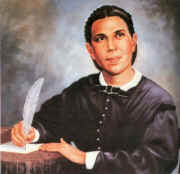|
IN DEFENSE OF THE FAITHThe
Truth About Seventh-day Adventists A
REPLY TO CANRIGHT by
William
H. Branson
CONTENTS
1.
What Did Mr. Canright Renounce? 3.
Objections Raised to the Moral Law 5.
When and to Whom Was the Sabbath Given? 7.
The Nature of the Sabbath Commandment 8.
The Sabbath of the New Testament 10.
The Sabbath on a Round World 14.
The Cleansing of the Sanctuary 15.
Who Are the Seventh-day Adventists? 16.
The Work of Mrs. E. G. White 17.
Mr. Canright's Remarkable Admission A.
The days of Creation are Literal 24 Hour days B.
The Ten Commandments Are God's Character C.
God's Law Is Eternal D.
Sabbath Preserved in Old Testament Times E.
The Ten Commandments F.
Jesus Kept all Ten Commandments G.
The Two Laws - Moral and Ceremonial H.
The Apostle Paul and the Law I.
The law in Galatians J.
587 References in the NT to The Ten Commandments K.
Summary of the NT References to The Ten Commandments L.
Fourteen Texts Used Against the Sabbath Answered M.
The Ten Commandments in Revelation N.
The Ten Commandments Before Sinai Dedicated
To All Who Believe In The Fundamental Principles Of Protestantism,
IN
the year 1889 D. M. Canright, who had some months before resigned the
pastorate of the Baptist
church at Otsego, Michigan, and who at one time had been a Seventh-day
Adventist preacher, published a book entitled Seventh-day Adventism
Renounced. Since that time a number of editions of the book have been
issued, and these, together with two other volumes and numerous tracts
by the same author, dealing with the same subject, have been widely
circulated. After
Mr. Canright. renounced the Seventh-day Adventist faith he became a
great opposer of their teachings, spending much of his time following
their evangelists from tow to town and publicly denouncing them. He held
their teaching of the imminence of the second coming of Christ up to
ridicule. He loudly challenged their belief that the Ten Commandments,
known as the Ten Commandments, were still binding upon Christians. He
made sport of their interpretation of Bible prophecy and declared that
there was no evidence proving that Christ's Second Advent was near at
hand. So
strenuous was Mr. Canright's opposition to the faith and teachings of
Seventh-day Adventists that leaders of various religious organizations
who felt the need of assistance in refuting Adventist doctrines turned
to him for help. He became recognized a s the champion opposer of
the Adventists. The
introduction to Seventh-day Adventism Renounced was written by Rev.
Theodore Nelson, pastor of the First Baptist Church, Saginaw, Michigan.
The Michigan Christian Advocate (Methodist) pronounced it a dumb
founder to the Adventists, and clergymen of various evangelical
churches have given it their hearty endorsement and have aided in its
circulation. We
grant that Mr. Canright was the most logical of all the various opposers
of the teachings of Seventh-day Adventists. Before his day no one had
attempted to refute many of their doctrines; since his death no new
arguments have been presented by more modern opponents. Practically
every succeeding book, pamphlet, or tract that has been published
against Adventist doctrines has constituted merely a restatement of the
arguments thought out and first published by Mr. Canright. If,
therefore, Mr. Canright's arguments can be successfully disproved, the
arguments of all those who have made use of his teachings will likewise
be refuted. Mr.
Canright died May 12, 1919. During his lifetime a number of brief
replies to his lectures and works were published by representatives of
the Seventh-day Adventist denomination, none of which are now in print.
It was not expected that any further notice would need to be taken of
the matter. However, since Mr. Canright's death certain religious
organizations have become especially zealous in republishing and
circulating his writings. In effect, this means that Mr. Canright's
influence still lives and is active through his publications. In
view of this zeal on the part of those who have assumed the
responsibility of circulating Mr. Canright's writings, resulting in
confusing the minds of some as to the character and work of the Seventh day
Adventist Church. We have felt it proper to prepare this additional
giving reply to Mr. Canright's views, publishing our defense in book
form so that it may be permanently available to all who may desire it. Though
the work Seventh-day Adventism Renounced constitutes an attack on the
doctrines taught by Seventh day Adventists, it is at the same time a
challenge to the whole Protestant world, for in this work Mr. Canright
renounces not only Seventh-day Adventism but also the .fundamental
teachings of the great Protestant churches concerning the law of God. It
seems more than passing strange that certain religious leaders should
give their endorsement as many have done, and as some are still doing -
to a book which not only attacks Seventh-day Adventism but also presents
arguments which, if they were sound, would overthrow some of the
historic foundation principles of their own church creeds. Says
the greatest evangelist of all modern times: The law that was given
at Sinai has lost none of its solemnity. Time cannot wear out its
authority or the fact of its authorship.... I have never met an honest
man that found fault with the Ten Commandments.-D. L. Moody, Weighed
and Wanting, p. 11. In
defense of fundamental Bible truths, and especially of the moral law,
spoken by the Creator in awful majesty from Mount Sinai, and honored,
magnified, and obeyed by our Lord Jesus Christ, this present volume is
sent forth to honest-hearted readers everywhere.
|

